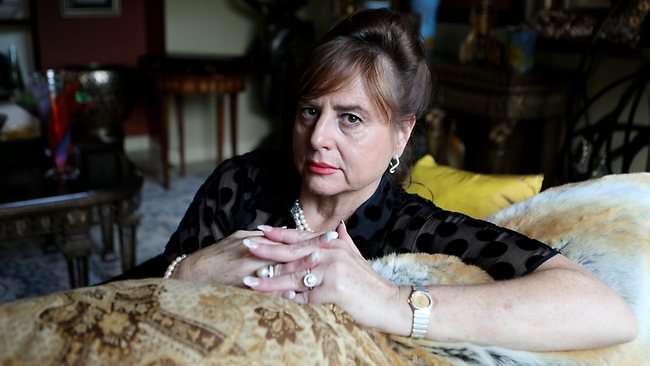Madam Shirley Brifman 'murdered to protect crooked police'
FITZGERALD inquiry investigators took seriously claims that madam and prostitute Shirley Brifman was killed to stop her giving evidence.
CORRUPTION investigators at the Fitzgerald inquiry in Queensland took seriously claims that Australia's most notorious brothel madam and prostitute, Shirley Brifman, was killed in 1972 to stop her giving evidence against infamous detectives and Sydney underworld figures.
The Weekend Australian has obtained a detailed confidential memo written in 1988 by Ross Martin SC, now the head of Queensland's Crime and Misconduct Commission, who spoke to a number of witnesses.
In the early 1970s, former police commissioner Ray Whitrod and one of his top detectives suspected Brifman was murdered, at a time when a cadre of corrupt police were linked to other deaths and attempts to control the force.
The internal Fitzgerald inquiry document includes the claims of Brifman family members and a friend that they saw Brifman being visited, just hours before she died on March 4, 1972, by a woman close to detective Tony Murphy. He had been charged with perjury the previous month as a result of evidence Brifman gave to Whitrod's anti-corruption detectives.
Brifman's daughter, Mary Anne, told The Weekend Australian yesterday she knew what she had seen as a 15-year-old in the Brisbane flat her family were hiding in, just hours before her mother's fatal overdose.
Ms Brifman, now 56, who followed in her mother's footsteps and became a prostitute and Sydney brothel madam, insisted that she tried to tell police in 1972 of the unusual visit by the woman close to Murphy.
The inquiry document shows that, in 1988, Mr Martin -- one of Tony Fitzgerald QC's investigative lawyers during the landmark probe that exposed rampant corruption -- spoke to three Brifman family members and a friend. They confirmed seeing the visitor that night.
Mr Martin's memo states: "As the time approached for Shirley to give evidence against Murphy, Shirley became more and more erratic and quite fearful but she remained determined.
"During the evening, there was a visitor. The visitor came upstairs alone but there was someone unidentified waiting in a car downstairs. (The visitor) was wearing a scarf around her hair and had a big coat on. Shirley then took (the visitor) into a bedroom and spoke to her privately for more than half an hour.
"When (the visitor) was going through the flat to leave, Mary Anne came and joined her and Shirley. Other family members were present. (The visitor) was insisting that Shirley take something from her and Shirley said no, she didn't want it and was definitely going to court.
"She said: 'Well Shirley, you know what we've spoken about. I think I should leave this with you because you know what'll happen'.
"The conversation went on for a few minutes and then Shirley accepted the small item that (the visitor) gave her.
"Mary Anne didn't see it but it was too small to be much other than tablets and her mother's history of abuse of tablets continued to that conclusion.
"Mary Anne remembers that later that night there was a big fight between her father and Shirley about what had been given to her . . . Shirley's denials that she had been given pills did not convince the family, who were sure that Shirley now had some medication she could take.
"An unsuccessful search of the flat was conducted. When asked to show what she had been given, Shirley's refusal indicated it was tablets. Mary Anne says she and her sister stayed up as late as they could to keep an eye on their mother but eventually they went to bed."
Mr Martin's briefing note states of Ms Brifman's disclosures: "It may be that (she) is simply an opportunist, hoping that by telling us what she imagines we want to hear she can gain some advantage, however, she does not present as such. She does not take opportunities obviously available to enhance the story and sometimes the things she says and the way they are remembered have the ring of truth."
He concluded that it would be impossible to progress the investigation, as the recollections of the witnesses were not all consistent and they differed from the 1972 historical record, adding that "police reports which one would expect to see are missing".
Murphy, who stood to lose everything because of Brifman's allegations of endemic corruption, always denied he had anything to do with her death. The Fitzgerald inquiry's final report did not find he was involved in any way. Murphy has died and his daughter did not return calls.
Ms Brifman said she hoped a new book featuring her mother, Three Crooked Kings by Brisbane journalist Matthew Condon, would lead to a resolution of a mystery that had lasted 41 years.
"My mother introduced me to prostitution. But she was a victim herself. The police used my mother and she used them. For my mother's sake, and for history, I would like to know the truth."



